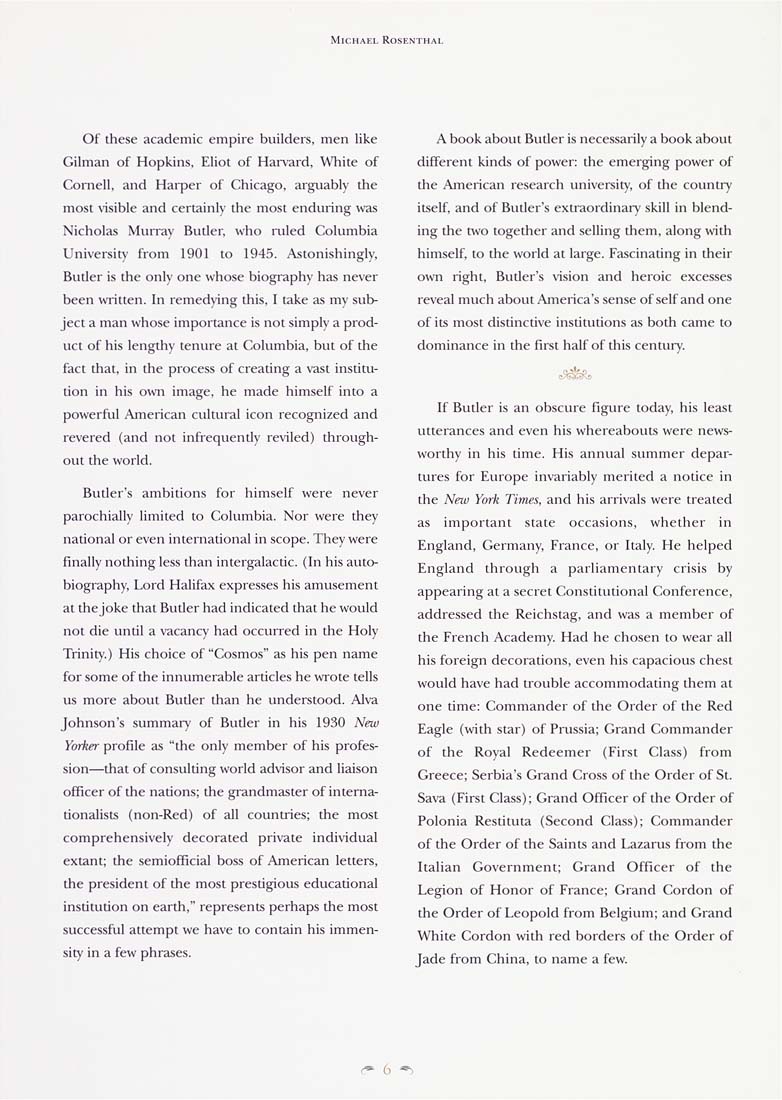Columbia Library columns (v.44(1995))
(New York : Friends of the Columbia Libraries. )
|
||
|
|
|
|
| v.44,no.2(1995:Autumn): Page 6 |

Michael Rosenthal
Of these academic empire builders, men like
Gilman of Hopkins, Eliot of Harvard, White of
Cornell, and Harper of Chicago, arguably the
most \isible and certainly the most enduring was
Nicholas Murray Butier, who rtiled Columbia
University from 1901 to 1945. Astonishingly,
Buder is the only one whose biography has never
been written. In remedying this, I take as my sub¬
ject a man whose importance is not simply a prod¬
uct of his lengthy tenure at Columbia, but of the
fact that, in the process of creating a vast institu¬
tion in his own image, he made himself into a
powerful American cultural icon recognized and
revered {and not infrequently reviled) through¬
out the world.
Butler's ambitions for himself were never
parochially limited to Columbia. Nor were they
national or even international in scope. They were
finally nothing less than intergalactic. (In his auto¬
biography. Lord Halifax expresses his amusement
at the joke that Buder had indicated that he would
not die until a vacancy had occurred in the Holy
Trinity.) His choice of "Cosmos" as his pen name
for some of the innumerable articles he wrote tells
us more about Butier than he understood. Alv-a
Johnson's summary of Butler in his 1930 Neio
Yorker profile as "the only member of his profes¬
sion—that of consulting world advisor and liaison
officer of the nations; the grandmaster of interna¬
tionalists (non-Red) of all countries; the most
comprehensively decorated private individual
extant; the semiofficial boss of American letters,
the president of the most prestigious educational
institution on earth," represents perhaps the most
successful attempt we have to contain his immen¬
sity in a few phrases.
A book about Buder is necessarily a book about
different kinds of power: the emerging power of
the American research university, of the country
itself, and of Buder's extraordinary skill in blend¬
ing the two together and selling them, along with
himself, to the world at large. Fascinating in their
own right, Buder's \ision and heroic excesses
reveal much about America's sense of self and one
of its most distinctive institutions as both came to
dominance in the first half of this century.
If Butler is an obscure figure today, his least
utterances and even his whereabouts were news¬
worthy in his time. His annual summer depar¬
tures for Europe invariably merited a notice in
the Neiu York Times, and his arrivals were treated
as important state occasions, whether in
England, Germany, France, or Italy. He helped
England through a parliamentary crisis by
appearing at a secret Constitutional Conference,
addressed the Reichstag, and was a member of
the French Academy. Had he chosen to wear all
his foreign decorations, even his capacious chest
wotdd have had trouble accommodating them at
one time; Commander of the Order of the Red
Eagle (with star) of Prussia; Grand Commander
of the Royal Redeemer (First Class) from
Greece; Serbia's Grand Cross of the Order of St.
Sava (First Class); Grand Officer of the Order of
Polonia Restituta (Second Class); Commander
of the Order of the Saints and Lazarus from the
Italian Government; Grand Officer of the
Legion of Honor of France; Grand Cordon of
the Order of Leopold from Belgium; and Grand
White Cordon with red borders of the Order of
Jade from China, lo name a few.
<f=' 6 =^
|
| v.44,no.2(1995:Autumn): Page 6 |







